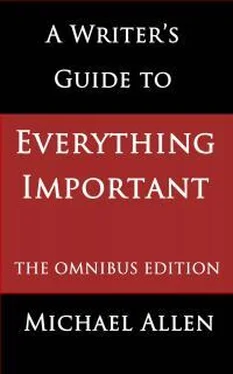9. Stylometry: science and style
It is probably worth saying just a little at this stage about the mysterious ‘science’ of stylometry. I put the word science in inverted commas because I am as yet somewhat sceptical about its validity; not to mention its practical value.
However, let us persevere. It seems that, just as the fog index measures readability, computers can be programmed to detect changes in style over time, and similarities (or absence of same) between two pieces of text, to determine whether or not they were written by the same person.
9.1 The Case of Iris Murdoch
In 2004, most of the UK’s up-market newspapers carried a report of some research carried out by Peter Garrard, of the institute of cognitive research at University College, London. Garrard and his colleagues compared the early novels of Iris Murdoch with her final work, and concluded that, towards the end of her life, her vocabulary had dwindled and her language had become simpler. This, they suggested, provided evidence of Alzheimer’s disease some time before the writer was actually diagnosed as suffering from that condition.
Well, there seems to be no doubt that Iris Murdoch did suffer from Alzheimer's disease, and I am quite prepared to believe that this showed up in the way she wrote. However, there are a couple of points that I would like to make in relation to Garrard’s research and in relation to Iris Murdoch’s writing generally.
First, it would come as no surprise to me if, over the course of a writing career lasting twenty or thirty years, a writer’s style did become simpler, using a larger proportion of short words. From casual, rather than scientific, observation, it seems to me that young writers, particularly in the literary genre, do tend to think it clever to use great long rambling sentences (the Faulkner influence) and to employ words with a multiplicity of syllables. Their style, in short, is consciously and deliberately sesquipedalian. And ten to one you've had to go to the dictionary to find out what that means. Young people think it’s clever to do that sort of thing, and it isn’t. It is entirely possible, I hope, that in the course of writing a few books, and listening to some wise advisers, a writer might learn to write in a more readily comprehensible manner.
After all, the whole point of fiction is to create emotion, and the whole point of non-fiction is to convey information. Neither objective is achieved by being long-winded and obscure. Faulkner once criticised Hemingway on the grounds that he never used a word which would oblige the reader to consult a dictionary. But Hemingway’s response, which I fully endorse, was that he was trying to produce emotion, and you don’t do that by using words that the reader can’t understand.
In non-fiction, exactly the same applies, of course. Some decades ago there was a famous American journalist called Ed Murrow. Towards the end of his career, Murrow was told by an eminent professor of English that the prof had identified the secret of Murrow’s success. It was short sentences. Murrow's comment was that he didn't think short sentences were much of a secret.
So, back to Iris Murdoch. Yes, Peter Garrard and his friends are probably right. Iris’s last book probably does reveal early signs of Alzheimer's. But it is at least possible, in theory, that she had decided to write in a way which could be understood by people who don’t actually have a PhD and an IQ of 175.
The second point I want to make relates to the actual examples of Iris Murdoch’s prose which Garrard quotes. Here’s one sentence from an early novel, The Sea, The Sea , followed by one from her last book, Jackson's Dilemma .
Quote 1: ‘The chagrin, the ferocious ambition which James I am sure quite unconsciously, prompted in me was something which came about gradually and raged intermittently.’
This, I repeat, is just one sentence, presumably chosen at random but intended to be fairly typical of Iris’s early style. It would be grossly unfair to read too much into one sentence, but what can we say about it?
Well, if I had read this sentence in isolation, not knowing who had written it, I would say that it seems thoroughly sloppy. It is a sentence written by someone who is writing on automatic pilot, putting down the thoughts pretty much as they popped into her head, and not bothering to rearrange them in a sensible order once they were set down on paper. Furthermore, the punctuation stinks. It is the kind of construction that you might expect to find in a letter dictated by a busy estate agent.
What on earth is the woman on about? Chagrin seems to me to have nothing to do with raging ambition, though the connection may be clear if you read the sentence in context. Even so, the whole thing screams out for an editor’s pencil, or, better still, a complete rewrite on the part of the author, who suddenly realises (as one does) that what she has written down in the full flood of inspiration doesn’t actually make much sense.
Let us now look at the sentence quoted from her last book, Jackson’s Dilemma .
Quote 2: ‘Owen had laid out a little table with whisky and red wine and orange juice and ham sandwiches and plums and cherry cake.
Dr Garrard tells us (and I believe him) that the sentence from The Sea, The Sea contains 24 tokens of 22 different word types, and that the second sentence contains 25 tokens of 20 word types; over the course of a large text these differences become highly significant.
Stylistically, however, the second sentence seems to me to be an improvement. Admittedly, all those ‘ands’ might be criticised, but they don’t bother me unduly. And at least the meaning is crystal clear. The difference between the two styles is, however, ascribed in this case to incipient Alzheimer’s, rather than a conscious decision to adopt a simpler style.
Unfortunately, Iris Murdoch had little incentive to change anything. Ever. She was told, by a host of sycophantic critics, early in her career, that she was a terrific writer, and was frequently described as ‘the most brilliant woman in England’; so why consider change? The fact that there were masses of people, like me, who tried to read one of her early books, found it impenetrable, and never bothered to try again, doesn’t seem to have disturbed Iris or anyone on her team.
So, at the end of her life Iris had become another of those well known literary figures (such as Sylvia Plath) who are talked and written about a great deal but are hardly ever read. Such is the fate of writers who believe their own publicity.
9.2 The Case of Agatha Christie
In 2010, Professor Ian Lancashire, an English prof at the University of Toronto, analysed 16 Agatha Christie novels, written over a 50-year period, and fed the text into a program called TACT (which you can reportedly download for free, should you be interested). Lancashire’s aim was to determine whether Agatha had changed her style over time.
Once again, the researcher claimed that the data supported the view that Agatha Christie had developed Alzheimer’s by the time she wrote her final novel.
Maybe so; although, unlike Iris Murdoch, Agatha was never reported, while she was alive, to be suffering from this condition. Furthermore, at least one commentator remarked of this research that it ‘may be reading something into the late Agatha Christie books that is barely there.’
I agree.
9.3 Unmasking anonymous authors
Another newsworthy aspect of the computerised analysis of text is its use in identifying the authorship of anonymous and pseudonymous texts.
In 2004 there was a flurry of excitement in some quarters over the identity of the author of a blog about a young woman who called herself Belle de Jour.
Читать дальше












